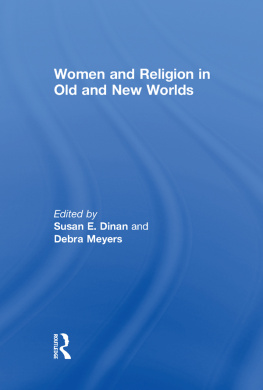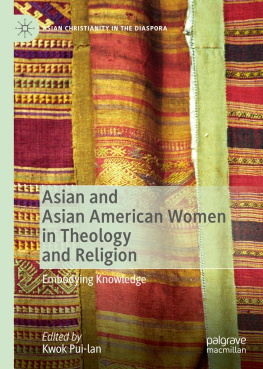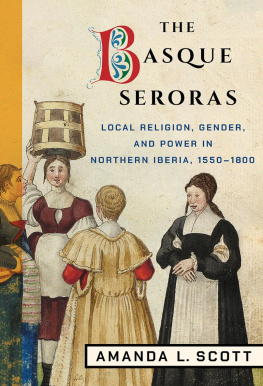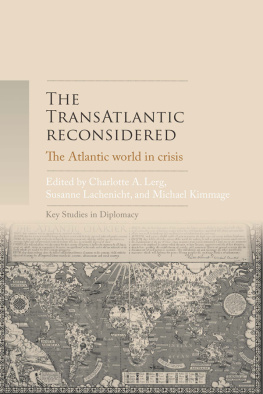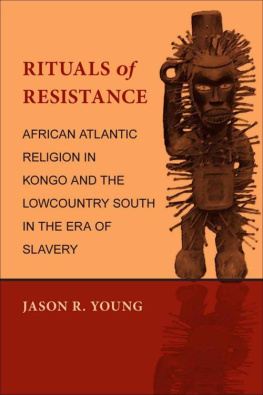WOMEN AND RELIGION IN THE ATLANTIC AGE,
15501900
Women and Religion in the
Atlantic Age, 15501900
Edited by
EMILY CLARK
Tulane University, USA
and
MARY LAVEN
University of Cambridge, UK
First published 2013 by Ashgate Publishing
Published 2016 by Taylor & Francis
2 Park Square, Milton Park, Abingdon, Oxon OX14 4RN
711 Third Avenue, New York, NY 10017, USA
Routledge is an imprint of the Taylor & Francis Group, an informa business
Copyright 2013 Emily Clark and Mary Laven
All rights reserved. No part of this book may be reprinted or reproduced or utilised in any form or by any electronic, mechanical, or other means, now known or hereafter invented, including photocopying and recording, or in any information storage or retrieval system, without permission in writing from the publishers.
Emily Clark and Mary Laven have asserted their right under the Copyright, Designs and Patents Act, 1988, to be identified as the editors of this work.
Notice:
Product or corporate names may be trademarks or registered trademarks, and are used only for identification and explanation without intent to infringe.
British Library Cataloguing in Publication Data
A catalogue record for this book is available from the British Library
The Library of Congress has cataloged the printed edition as follows:
Women and religion in the Atlantic age, 15501900 / edited by Emily Clark and Mary Laven.
pages cm
Includes bibliographical references and index.
ISBN 978-1-4094-5274-4 ISBN 978-1-3155-4686-5 (ebook) ISBN 978-1-1347-7303-9 (epub) 1. Women and religionAtlantic Ocean RegionHistory. 2. Atlantic Ocean Region Religion. I. Laven, Mary, 1969 editor of compilation.
BL458.W56377 2013
200.82'091821dc23
2013007741
ISBN 9781409452744 (hbk)
ISBN 9781315546865 (ebk)
Contents
Emily Clark and Mary Laven
Patrick Collinson
Robin Briggs
John J. Clune, Jr
Emily Clark
Annette Laing
Cathy Skidmore-Hess
Susan OBrien
Hazel Mills
Timothy J. Lockley
Notes on Contributors
Robin Briggs is an Emeritus Senior Research Fellow, All Souls College, Oxford, and a Fellow of the British Academy. He has published extensively on early modern French history and the history of witchcraft, and is currently writing a synoptic study of the history of north-western Europe.
Emily Clark is Clement Chambers Benenson Professor of American Colonial History and Associate Professor at Tulane University. She is the author of Masterless Mistresses: The New Orleans Ursulines and the Development of a New World Society, 17271834 (2007) and The Strange History of the American Quadroon: Free Women of Color in the Revolutionary Atlantic World (2013).
John J. Clune, Jr is Professor and Chair of the History Department at the University of West Florida. He is the author of Cuban Convents in the Age of Enlightened Reform (2008) and co-author of Historic Pensacola (2009).
Patrick Collinson, who died in 2011, was Emeritus Regius Professor of Modern History at the University of Cambridge and a Fellow of Trinity College. His voluminous writings include The Elizabethan Puritan Movement (1967), The Religion of Protestants: The Church in English Society 15591625 (1982), The Birthpangs of Protestant England (1988) and Elizabeth I (2007).
After a successful career as an academic historian, Annette Laing now works full-time performing and writing history for children, and is best known as the author of the Snipesville Chronicles. Her academic publications include A Very Immoral and Offensive Man: Religious Culture, Gentility, and the Strange Case of Brian Hunt, South Carolina, 1727, South Carolina Historical Magazine (2002) and Heathens and Infidels? African Christianization and the Anglican Mission in the South Carolina Low Country, 17001750, Religion and American Culture (2002).
Mary Laven teaches History at the University of Cambridge, and is a Fellow of Jesus College. Her publications include Virgins of Venice: Enclosed Lives and Broken Vows in the Renaissance Convent (2001) and Mission to China: Matteo Ricci and the Jesuit Encounter with the East (2011).
Tim Lockley is a Reader in the School of Comparative American Studies at the University of Warwick. He researches race, class and slavery in the antebellum American South. He is the author of Lines in the Sand: Race and Class in Lowcountry Georgia 17501860 (2001) and Welfare and Charity in the Antebellum South (2007).
Hazel Mills is a Principal Investigator on the University and Life Experience Project at Girton College, Cambridge. Having previously worked on the relationship between women and the Catholic Church in nineteenth-century France, her current research interests include the travels and writing of Bessie Rayner Parkes, and womens higher education in France and Britain in the twentieth century.
Susan OBrien is a Senior Member of St Edmunds College, University of Cambridge. Her research is in the history of women religious since 1800 and she is currently writing a history of the Daughters of Charity of St Vincent de Paul in Britain.
Cathy Skidmore-Hess is Assistant Professor of African history at Georgia Southern University. Her research interests are gender, religion and the environment. She has published several articles on womens political and religious leadership as well as the role of the environment in the political economy of Southern Africa.
Acknowledgements
Thanks to Sylvia Frey and Gill Sutherland for inspiration and encouragement over many years, to Ron Biava and Jason Scott-Warren for their advice and support when we needed it, to Tom Freeman for so generously helping to revise Patrick Collinsons essay, to Tom Gray at Ashgate for recognising the value and originality of our project, and to all our contributors for their collective patience and good humour.
Introduction
Emily Clark and Mary Laven
The inspiration for this volume emanates from two historiographic strands: early modern religious history and the study of the Atlantic World. The former is a mature tradition, sustained by a voluminous body of scholarship that explores the evolution and course of the religious reformations of the sixteenth century and their institutional and devotional ramifications in the seventeenth. As is often happily the case, as new fields of scholarship emerge they nudge the boundaries of older traditions and invite the extension of familiar themes in previously unimagined directions. In this volume, our adoption of the Atlantic paradigm has forced us to rethink the conventional chronology of religious history and, in particular, to reject the hiatus that is usually imposed between early modern and modern. Our vision of religious change reaches from the sixteenth to the nineteenth centuries and is underpinned by the connections and encounters that linked Europe, Africa, and the Americas. Onto this framework we have overlaid a third analytical strand: gender. By laying bare the gendered dimensions of church history and by focusing on women as agents of change, we offer a series of new perspectives on the religious development of the Atlantic World.


